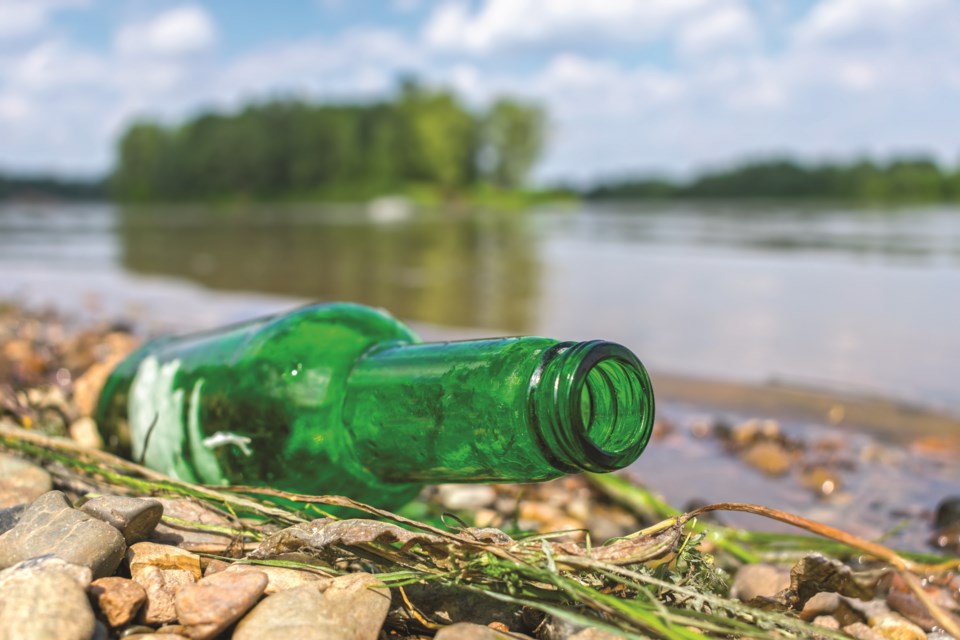On Monday I arrived at Alpha Lake Park in the early morning hours to work on a burdock patch I’ve been winnowing down for a few years. As I moved to dig some up at the edge of the parking lot, I noticed a pile of empty cans, drink bottles and wrappers that had clearly been ejected from a car the previous evening and left to who knows what ends. While I stared, others passed them by not noticing or, if they did, looking away.
As usual, my immediate thoughts pinballed between wondering who does things like this and why, to what’s wrong with people in general and why it’s still happening in Whistler despite all the messaging to the contrary? Our parks—and other parts of the valley—fill with garbage daily in the summer, and there are hundreds of piles like this to contend with. Though most are left by visitors with no skin in the local game, some is the doing of locals who have no qualms over tossing a beer can in the bush. In either case, this inexplicable selfishness and entitlement is nature-negative thinking: it’s no big deal, it’s a parking lot, I couldn’t find a garbage can, someone else will clean it up.
Our collective thinking, of course, should be the exact opposite: we should all want—no, need—to find a garbage receptacle no matter what. Whether we’re in a hurry or can’t see one in our field of view, securing trash should always be job one—even if we have to take it home: I am responsible for this; I cannot despoil the environment or harm wildlife. It’s a directive that should be kneaded into our psyches from an early age and baked into our consciousness. Keeping our home free from trash would then translate to keeping others’ homes trash free, which would scale upward from local, to regional, national and global consciousness on the environment in general. If we were more nature-positive in our outlook around something so basic, then every other human endeavour would flow in a similar direction.
Such a psychological shift could be a real game-changer when it comes to tackling the big crises of our times, climate change and biodiversity loss. It could be even bigger in heading off Brobdingnagian environmental problems in the first place. Such was the thinking on May 28 this year when Allish Campbell, Canada’s Ambassador to the EU, joined the WWF European Policy Office in organizing an online presentation of a consensus position paper authored by 12 ENGOs: A Nature-Positive World: The Global Goal for Nature.
The event featured scientific and international experts exploring the study’s core idea—a nature-positive world. The paper called for a set of actions based on Earth-systems science. For the sake of typical human-goal setting and institutions that have been overwhelmed by the biodiversity crisis in much the same way as we’ve all been overwhelmed by the climate crisis, it set out a simple, concrete global target that aims to bend the curve on species loss and extinction such that the trend is reversed to a level of zero-net-loss by 2030. The discussion was led by the paper’s lead authors: Canada’s Harvey Locke, chair of the IUCN WCPA Beyond the Aichi Targets Task Force at Yellowstone to Yukon Conservation Initiative in Banff, and Johan Rokström, Director of the Potsdam Institute for Climate Impact Research and Professor in Earth System Science at the University of Potsdam. They were joined by Marco Lambertini, Director General of WWF International. The main takeaways:
• We need integrated global strategies and synergies between global climate, sustainability and biodiversity political processes. Consensus on the linked relationship between climate and biodiversity (biodiversity loss accelerates climate change and vice-versa) suggests that shared solutions can produce multiple co-benefits, thus a need to find synergies between climate, biodiversity and development agendas. In other words, high-level political commitments should reciprocally mainstream biodiversity and climate aspects. In order to do this in a way that all can understand, a clear, global goal for nature is needed—a simple success metric to mobilize commitment the way the 1.5˚C target mobilized commitment to the Paris Climate Accord.
• As mentioned above, that global goal for nature is to become nature-positive by 2030, a target that means achieving zero-net-loss of nature from today. This requires a global shift towards sustainable production and consumption patterns. Attaining a 30 per cent level of land protections by 2030 (on the table for an upcoming global biodiversity convention) is essential to the success of this target; the ultimate shared goal should be to achieve an equitable, nature-positive, carbon neutral world by 2050.
• We need a conceptual shift to a nature-positive hierarchy. This requires transforming our perception of how things relate to each other. Instead of the usual intersectional conceptualization of environment, economy and society as three circles, where sustainable development can only be achieved in some overlapping sweet-spot, we need a hierarchical visualization of the environment-society-economy nexus, where economy is the outcome, society the medium it occurs in, and both are imbedded in a nature that creates all benefits.
• From a planetary boundary framework and Earth-systems science perspective, there’s great support for the adoption of a global nature target. We are currently at high risk of destabilizing the Earth-system equilibrium, which is experiencing unprecedented pressures (hello heat wave!). If you want to know more about this, check out Breaking Boundaries: The Science of Our Planet on Netflix. Co-hosted by Rockström and David Attenborough, the film puts the current collapse (at this point not too strong of a word) of Earth’s biodiversity into perspective and shows how the crisis can be averted through nature-positive actions.
Finally, we can all help steer minds and outlooks in a more nature-positive direction. I might have started by not wondering who dumped garbage at Alpha Lake, but by just picking it up myself—like I was cleaning my home.
Leslie Anthony is a science/environment writer and author who holds a doctorate in connecting the dots.




